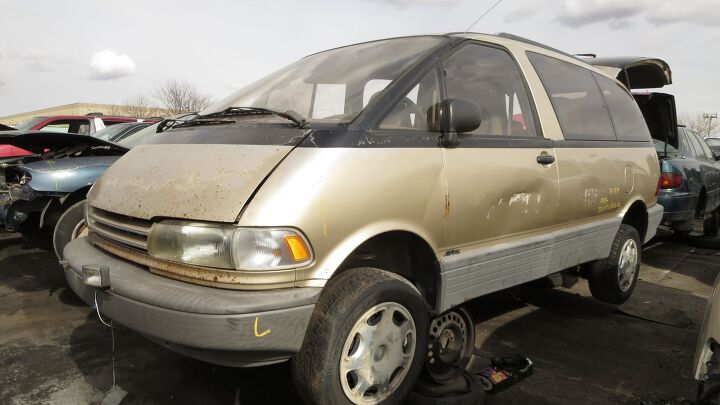#Previa
Junkyard Find: 1994 Toyota Previa LE With 376,407 Miles
Ever since the 1998 model year, Toyota has sold a big, American-style minivan with the engine in the front and cupholders throughout the interior. Prior to that, though, American Toyota shoppers looking for a new van had to take an innovative mid-engined machine designed entirely with the Japanese home market in mind: First the TownAce (known as the Van here) and then the Estima (known as the Previa here). The Previa was too small and too underpowered to compete head-to-head with Detroit minivans, but those who bought them found that they lasted for decade after decade. Here’s one in a Denver-area yard that got pretty close to the magical 400,000-mile mark.
Rare Rides: A Supercharged 1995 Toyota Previa, Mystical Minivan
Of all the Good Nineties Minivans, the Toyota Previa (like the Mercury Villager Nautica) stands out. Engine in the middle, driven wheels at the rear, superior build quality, and supercharging all made for a unique minivan offering never seen before or since.
But unique didn’t sell in America (still doesn’t), and the Previa taught Toyota a lesson about its customers.
Junkyard Find: 1992 Toyota Previa All-Trac
Living in Colorado, I have become something of a connoisseur of low-sales volume, all/four-wheel-drive versions of otherwise commonplace vehicles. The rarest one so far has got to be this ’87 Ford Tempo AWD, but I also have managed to find some fairly unusual All-Trac-equipped Toyota vehicles.
There’s this ’90 Camry All-Trac, a car that’s a rarity even in this state and just about unheard of anywhere else, and a few examples of the Corolla All-Trac wagon. Now we have this gleaming gold Previa All-Trac.
"THAT IS AWESOOOOOOOOOO…!!!"
There are longer minivan jumps you could watch, even some with explosions, but no flying family hauler can match the poise and grace of this 1980s Toyota Tarago.
Somewhere in rural Australia — possibly near a dingo — this sturdy conveyance not only survived its flight seemingly unscathed, it probably stopped off for a case of Fosters after the jump before driving a pack of blonde teens home.
Piston Slap: Norwegian Longroof Reformism?
TTAC Commentator Sjalabais writes:
Dear Sajeev,
I am and have always been a car guy. Since I am an academic with two left hands and sausage fingers, my flavour have been indestructible 70s Volvos, of which I have owned a couple.
Now I am a father and a bit cash-strapped, with the need for an occasional 7 seater. A Volvo V70 with rear facing extra seats has been voted down in the household assembly, I am thus looking for a blob-shaped car. My location is Norway, but my issue is recognisable for any car guy in this situation, I fear.
Piston Slap: A Turbocharged "Placenta Previa"?
Daniel writes:
Hi Sajeev,
I’m a long time reader, first time writer. I have a question which no one seems to know the answer to so I figure you and the B&B can have a go at it. I have a good condition spare turbo laying around from my MR2 turbo before I upgraded. I want to install this into my toyota previa. The problem is the area where the turbo will sit it will be exposed to the elements under the car ( rain, snow, salt) the way the exhaust manifold sits I have no choice. What sort of problems do you think I have in the future with the turbo being exposed like that? I’m in Chicago and this will be driven in winter. And the van is lowered too so the turbo will be pretty close to the ground.



















Recent Comments